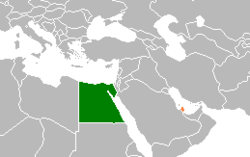Egypt–Qatar relations
Egypt–Qatar relations were the bilateral relations between the State of Qatar and the Arab Republic of Egypt. They first began in 1972 and ceased in 2017 due to the Qatar diplomatic crisis.[1]
 | |
Egypt |
Qatar |
|---|---|
Diplomatic representation
By January 1973, just two years after Qatar gained its independence, Egypt was among the eighteen countries that Qatar appointed an ambassador to.[2]
Political disputes
Egypt boycotted the MEMA Conference in Qatar in 1997 after asserting that Qatar was financing Islamic militant organizations in Egypt. They also accused Qatar's media of harboring an anti-Egypt agenda.[3][4] The conflict was mediated by Saudi Arabia later that year, but weeks after the intervention, Qatari authorities laid off 700 Egyptian workers in private and public sectors.[5] During the conference, the Qatari foreign minister accused Egypt of supporting to the 'plotters', referring to the 110 individuals tried over the February 1996 counter-coup attempt against emir Hamad bin Khalifa Al Thani.[3] Qatar began denying entry visas to Egyptian citizens and reportedly harassed Egyptian laborers.[3]
Relations after the 2013 Egyptian coup d'état
In July 2013, the Egyptian military ousted Qatari-supported president Mohamed Morsi. This severed tensions between Qatar and Egypt, with a number of Arab states backing Egypt in this dispute.[6] Qatar was most chastised by the Arab states for its harboring of Yusuf al-Qaradawi, a Muslim cleric who is alleged to have had a prominent role within the intellectual leadership of the Muslim Brotherhood.[7]
In March 2014, three Arab states removed their ambassadors from Qatar in protest of the alleged interference by Qatar in other countries internal affairs, which included financially supporting the Muslim Brotherhood in Egypt.[8] Around December 2014, Qatar moved to mend relations with Egypt amid pressure from other Persian Gulf countries, primarily Saudi Arabia.[9][10]
In February 2015, a month after the death of Abdullah of Saudi Arabia, another rift in relations emerged after Egypt conducted an airstrike over an ISIL bastion in Libya following the beheading of Egyptian Copts.[11][12] The airstrikes were condemned by Al Jazeera, who broadcast images of civilian victims.[12] Additionally, Qatar's foreign ministry expressed reservations over the airstrikes. This prompted Tariq Adel, Egypt's delegate to the Arab League, to accuse Qatar of supporting terrorism. Egyptian citizens also launched an online campaign denouncing Qatar.[13] The GCC rejected Egypt's accusations and its secretary general regarded the statements to be false.[14] Shortly after, Qatar recalled its ambassador to Egypt for consultations.[13]
2017 diplomatic crisis
On 5 June 2017, The Egyptian government, along with those of Saudi Arabia, Bahrain, and the United Arab Emirates, announced to cut diplomatic relations with Qatar. The Egyptian Foreign Ministry announced it was closing its operations to Qatari transportation. The Egyptian, Saudi, Bahraini, and Emirati governments cited Qatar's continuing support for "terrorism", such as the Muslim Brotherhood.[15] The Muslim Brotherhood in Egypt is banned by the government and considered a terrorist organization. Islam Hassan argues "Egypt has had troubled relations with Qatar for many years, except during the presidential period of Mohamed Morsi. The Egyptian government has seen Qatar as a source of instability. The Egyptian regime also sees that Qatar challenges its rule by financing the Muslim Brotherhood, and other organizations, which the regime has outlawed and consider terrorist organizations. Thus, the Egyptian regime has been trying to resist Qatar by any means. The current issue between the Saudi's and Qatar seemed to be an opportunity to put pressure on Qatar to stop financing the Muslim Brotherhood, its affiliates, and supporters, and to support the Sisi regime."[16][17]
Al Jazeera
In the early years after Al Jazeera's formation in 1996, it was often involved in the criticism of Hosni Mubarak, which prompted retaliation by Mubarak and the Egyptian media. In 1997, Egypt sent the head of its intelligence agency, Omar Suleiman, to respond to the news network's criticism of the Egyptian government.[4] In an interview in 2002, Mubarak blamed Al Jazeera for "spreading friction, enmity and instability among Arab countries".[18] A US diplomatic cable leaked from 2010 revealed that Hamad bin Jassim Al Thani told US senator John Kerry that he made an offer to Mubarak in which he would 'stop Al Jazeera for a year' if Egypt agreed to deliver a lasting settlement to the Palestinians during that period.[19]
After the 2013 Egyptian coup d'état, Abdel Fattah el-Sisi replaced Muslim Brotherhood affiliated Mohamed Morsi as president of Egypt. Sisi initiated a crackdown on Muslim Brotherhood's media allies, which included Al Jazeera, who provided several prominent Muslim Brotherhood spokesmen with media platforms.[20] This culminated in the arrests of Al Jazeera journalists Mohamed Fahmy, Peter Greste and Baher Ghorab in December 2013.[21] Al Jazeera broadcasts were banned in Egypt in September 2013 following accusations that the network was disrupting the internal affairs of the country.[22]
Economic relations
From January 2003 to June 2014, Egypt accounted for the largest share of all financial investments made by Qatari firms at 31.1 percent.[23]
During the one-year reign of Mohamed Morsi, Qatar assisted Egypt by sending it $7.5 bn in grants and loans. Following Morsi's ouster from power in July 2013, Egypt in September 2013 returned $2 bn that Qatar deposited in its central bank.[24] Between September and November 2014, Egypt paid back $2.5 bn in debts.[25] The last $1 bn of Egypt's debts to Qatar were paid out in July 2016.[26]
References
- "Bilateral Relations". Ministry of Foreign Affaris of Qatar. Archived from the original on 24 January 2015. Retrieved 15 January 2015.
- "The era of reform". New York: Permanent Mission of the State of Qatar to the United Nation. 1973. p. 4.
- Maddy-weitzman, Bruce (1999). Middle East Contemporary Survey: Volume 21. Westview Press. p. 124. ISBN 978-0813337623.
- Fendy, Mamoun (2007). (Un)Civil War of Words: Media and Politics in the Arab World (Praeger Security International). Praeger. p. 46. ISBN 978-0275993931.
- El-nawawy, Mohammed; Iskander, Adel (2003). Al-jazeera: The Story Of The Network That Is Rattling Governments And Redefining Modern Journalism Updated With A New Prologue And Epilogue. Basic Books; Reprint edition. pp. 131–132. ISBN 978-0813341491.
- "Egypt's break with Qatar could contribute to a scorching summer for country's residents". Washington Post. 21 May 2014. Retrieved 23 January 2015.
- Olivier Guitta (20 February 2006). "The Cartoon Jihad: The Muslim Brotherhood's project for dominating the West". The Weekly Standard.
- "Arab states withdraw ambassadors from Qatar in protest at 'interference'". The Guardian. 5 March 2014. Retrieved 23 January 2015.
- "Qatar moves to cut ties with Hamas and repair relations with Egypt". National Post. 30 December 2014. Retrieved 23 January 2015.
- "Egypt, Qatar Accept Saudi Initiative to Mend Ties". The Wall Street Journal. 20 December 2014. Retrieved 23 January 2015.
- Kirkpatrick, David (16 February 2015). "Egypt Launches Airstrike in Libya Against ISIS Branch". New York Times. Retrieved 23 March 2015.
- Hussein, Walaa (1 March 2015). "Qatar rejects Egypt's war on terrorism". Al Monitor. Retrieved 23 March 2015.
- "Qatar recalls ambassador to Egypt over ISIL row". Al Jazeera. 19 February 2015. Retrieved 23 March 2015.
- "GCC rejects accusation of Egypt to Qatar supporting terrorism". BBC Arabic. 19 February 2015. Retrieved 23 March 2015.
- "Four countries cut links with Qatar over 'terrorism' support". BBC News. 4 June 2017. Retrieved 4 June 2017.
- "Qatar Pursues an Independent Foreign Policy that Clashes with the Saudi's Strategic Interests" (PDF). Eurasia Diary. 8 June 2017. Retrieved 11 June 2017.
- "Saudi Diplomatic Offensive on Qatar to Barely Impact Anti-Terror Fight in Region". Sputnik International. 8 June 2017. Retrieved 11 June 2017.
- Thusu, Daya Kishan; Freedman, Des (2003). War and the Media: Reporting Conflict 24/7. SAGE Publications Ltd. p. 157. ISBN 978-0761943129.
- Bridges, Scott (2013). 18 days: Al Jazeera English and the Egyptian Revolution. Amazon Digital Services, Inc. p. 283.
- "Why Egypt Hates Al Jazeera". foreignpolicy.com. 19 February 2014. Retrieved 23 January 2015.
- El Deeb, Sarah (31 March 2014). "Canadian journalist asks Egyptian judge to free him: 'I ask for acquittal'". The Star.
- "Egypt Court Orders Broadcast Ban Of Al Jazeera". Huffington Post. 3 September 2014. Retrieved 23 January 2015.
- "Qatari firms top list of investors in Arab countries". The Peninsula. 29 December 2015. Retrieved 29 December 2015.
- "Egypt returns $2 billion to Qatar in sign of growing tensions". Reuters. 19 September 2013. Retrieved 26 August 2017.
- "Egypt pays back $2.5 billion deposit to Qatar: central bank official". Reuters. 28 November 2014. Retrieved 26 August 2017.
- "Egyptian cenbank pays back $1 billion debt owed to Qatar". Reuters. 1 July 2016. Retrieved 26 August 2017.
.svg.png)
